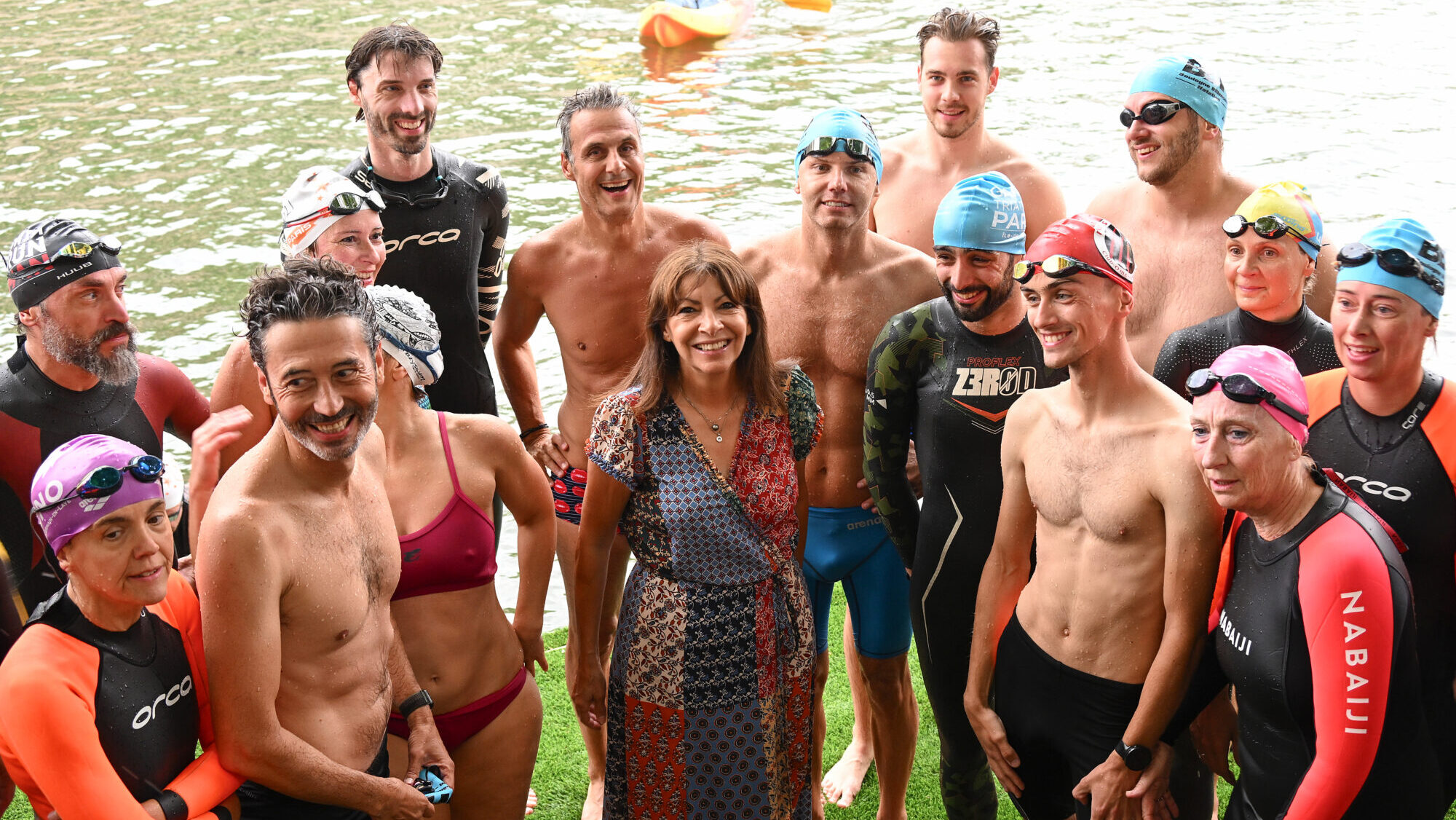
The mayor of Paris Anne Hidalgo poses with swimmers during the inauguration of the Bras Marie nautical base in Paris on July 9, 2023, as she announces the river Seine’s bathing sites planned for Parisians in 2025, as a legacy of the Olympic and Paralympic Games.
Photo: Bertrand GUAY / AFP
Paris mayor Anne Hidalgo’s ambition for the Olympic Games, which the French capital will host in the summer of 2024, is to hold the swimming events directly in the Seine rather than in an artificial pool. But for the time being, three test competitions designed to check that the river’s water is fit for human use have had to be cancelled one after the other because the water is still too polluted. Doubts are growing about the feasibility of the mayor’s project.
With less than a year to go before the start of the Games, which will kick off on July 26, 2024, three test events have been cancelled in the space of two weeks.
The first open-water swimming test event was cancelled at the beginning of August. The swimmers were due to dive from the emblematic Pont Alexandre III in front of the Invalides, but persistent rain over the previous week caused the sewers to overflow and polluted waste water to flow into the river.
The world triathlon then organised its test event in and around the Seine from August 17th to 20th. An initial measurement judged the water quality to be satisfactory, enabling a test event to be held for the men’s race on Friday, August 18th. “Not a single athlete came off sick,” said the reigning French world champion Léo Bergère, who is clearly optimistic.
However, the following events had to be cancelled due to excessive levels of Escherichia coli (E. coli) bacteria found in the river, as was the case at the beginning of August. “Analyses of three samples taken from the course showed levels in excess of the regulatory threshold of 1,000 CFU per 100 ml set by World Triathlon,” Pierre Rabadan, the deputy mayor of Paris responsible for sport, explained to AFP.
Since then, there have been revelations that an improperly closed sewage valve was the cause of the poor test results, a revelation that has fuelled accusations of amateurism against the Paris City Council staff.
Despite these repeated setbacks, sports minister Amélie Oudéa-Castéra remains optimistic and confident: “We just missed out. It’s extremely encouraging, we have to see the glass as half full,” she explained. The Olympic organisers are so confident that they have no plan B in case the tests are still bad at the time of the Games. “Plan B will be the Seine,” said Brigitte Légaré, head of competitions for the Olympic Games in Paris.
The political and symbolic stakes are high, as Paris mayor Annie Hidalgo has been personally committed to this issue since 2016, when she submitted Paris’s bid for the 2024 Olympics.
Swimming in the Seine is an old fad among Parisian councillors. More than thirty years ago, at the beginning of the 1990s, Mayor Jacques Chirac, before being elected Head of State, had already promised to make the Seine swimmable, envisaging himself taking part in the exercise “in front of witnesses.”
He never actually did it. Anne Hidalgo has not yet taken the plunge, unlike her two deputies for town planning, Emmanuel Grégoire, and for sport, Pierre Rabadan, but she has promised to do so “next year,” the year of the Olympics.
Many sportsmen and women are trying to keep a positive outlook and are using a variety of arguments to convince themselves that it is feasible: there is still a year to go; water filtering techniques are still being developed; it’s unprecedented, and it will remain a lasting achievement for Paris. Indeed, the City Council has announced that Parisians will be able to bathe in the Seine sustainably beginning in 2025.
Despite the official enthusiasm, some people remain cautious, like Pierre Le Corre, a French triathlete who just won a stage of the World Triathlon Championship Series in Sunderland, UK for the first time at the end of July. He told the press of his misgivings about the quality of the water just before the test event, ten years after his first attempt to swim in the Seine: “The two times I swam there at the time, I had vomiting at the end of the race and a bloated stomach for several days,” he explained to the newspaper 20 Minutes. For him, there’s no question of taking risks. “We’re going to take chlorine tablets. It’s not compulsory, but in view of recent analyses of the Seine, I think it’s better to take them.”
The ambition to make the Seine clean represents a colossal task. Paris’ emblematic river is polluted not only by upstream industries but also by 23,000 unauthorised connections by private individuals who dump their waste into the Seine and who therefore have to be connected to the municipal sewer system. For Anne Hidalgo, it’s worth it. What could be more wonderful than swimming at the foot of the Grand Palais and the Invalides?
